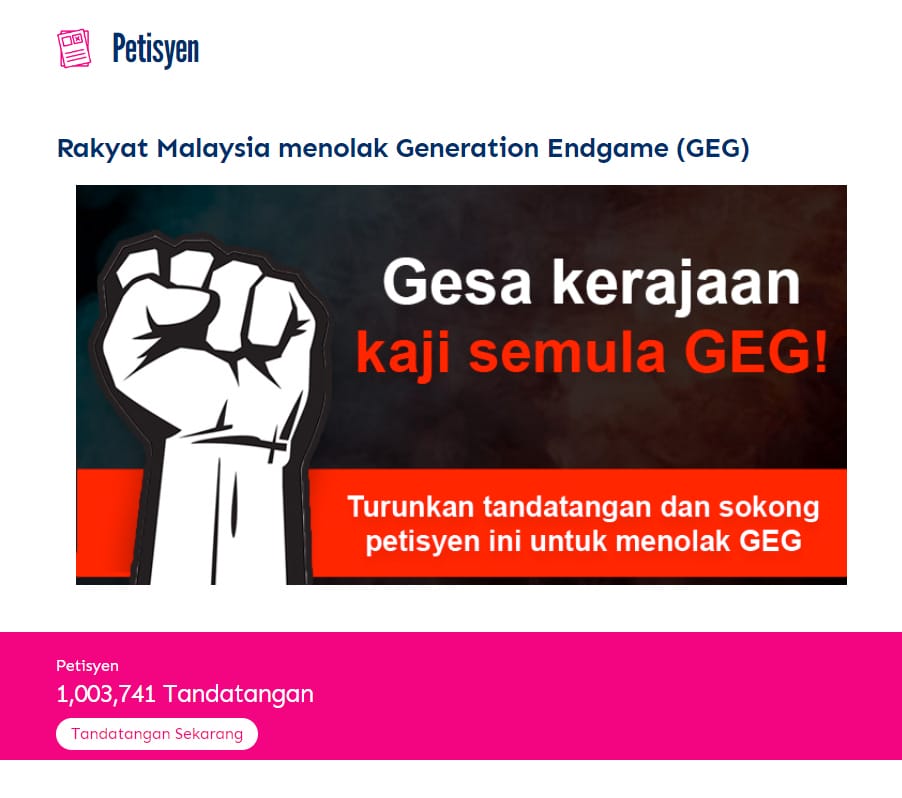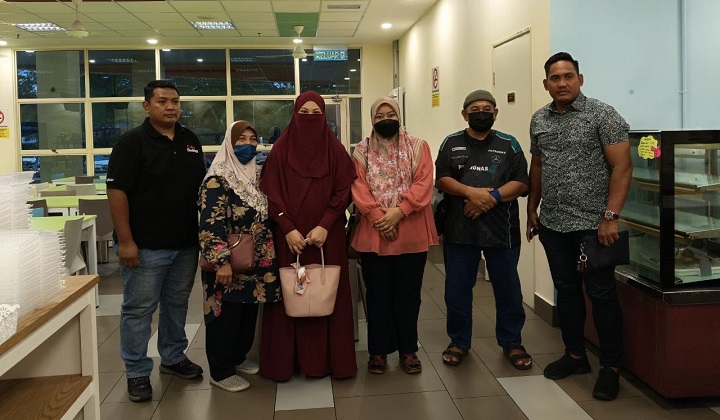The GEG Dilemma: Is It Fair Or Ineffective?
Is the GEG really a good idea for the greater good of Malaysia?

Subscribe to our Telegram channel or follow us on the Lumi News app for the latest stories and updates.
Malaysians are a proud and independent bunch. We value our rights and freedoms as much as we cherish our nasi lemak and kain batik.
We don’t like being told what to do, and we definitely don’t like it when others try to impose their values and beliefs on us. As a modern, diverse and progressive society, we believe in making our own decisions, choices and compromises to make things work for the greater good.
For this reason, millions of Malaysians are apparently standing together against the implementation of the Control of Tobacco Product and Smoking Bill or the Generational End Game (GEG).

Set to be tabled in Parliament on Monday (12 June), the GEG seeks to eradicate smoking by banning the use, purchase and sale of any type of smoking products to those born after 2007.
The Bill was first introduced by Former Health Minister Khairy Jamaluddin (KJ) who was ousted during the last General Election. Since then, the Madani government took it upon itself to continue KJ’s plight in hopes of making Malaysia a smoke-free country.
If the GEG passes, it will basically make it illegal for an entire generation of Malaysians to take a puff. Those who are caught doing so would probably face harsh fines and be forced to do community service while their predecessors sit idly by and smoke away without any legal ramifications.
The greater good?
Although the current Health Minister, Dr Zaliha Mustafa, has been trying to rally the support of fellow Members of Parliament (MP) to get behind the GEG, lawmakers still remain opposed to the idea.
Sungai Buloh MP Datuk R. Ramanan raised his objections towards the GEG on the ground that the law would deprive Malaysians of the right to freedom of choice.
Though he considers smoking to be a serious public health issue, the politician remained firm that the government should not morally police the people against their will.
I’m not saying that it is the right thing to allow the next generation to smoke, but it should be a choice for them and not something for us to take away from them. You give the power to 18-year-olds to decide the fate, future and the government of this country, but you don’t feel they are responsible enough to decide if they want to smoke.
Sungai Buloh MP Datuk R. Ramanan via NST.
Making his case, the lawmaker questioned why the government still subsidised sugar for public consumption if the goal was to manage and improve public health.
As you all may know, diabetes poses a tremendous public health problem in Malaysia. Around 3.6 million Malaysian adults are estimated to suffer from the disease. The number of diabetics in the country is also expected to reach 7 million people by 2025.
R. Ramanan believes that educating younger generations on the dangers of smoking may be a better way to go than implementing such punitive laws.
What is the cause and effect of the bill? How will it impact the economy and citizens of this country? I’m not advocating or encouraging smoking, but at the same time, I don’t believe you should take away a person’s right. If I were to be a parent in the future, I would make sure my child understands the adverse effects of smoking.
Sungai Buloh MP Datuk R. Ramanan via NST.
Meanwhile, some are concerned that the GEG’s prohibitory laws may work to the detriment of Malaysia’s efforts to eradicate smoking.
According to statements made by The Addiction Medicine Association Malaysia (AMAM) and the Federation of Private Medical Practitioners Associations Malaysia (FPMPAM), studies have shown that smokers need the right support systems to help them kick the habit instead of harsh laws that might get in the way of their recovery.
If indeed the Health Ministry envisions a healthier nation, then it must consider harm reduction strategies. It is too simplistic to envision that a country can be free from cigarettes and vaping without effective measures that support smokers. A prohibition-focused policy does not help and certainly does not support smokers to quit smoking.
AMAM President Dr Steven Chow and FPMPAM President Dr Shanmuganathan Ganesan via CodeBlue.
Read More: Over 1 Million Malaysians Think The Generational Endgame Is A Bad Idea
Regulate not prohibit-ate
It’s also been proven repeatedly that something won’t simply go away just because it’s been banned or prohibited.
For the longest time, e-cigs, vapes and other Electronic Nicotine Delivery Systems (ENDS) have been in a legal loophole in Malaysia where their sale and use are neither explicitly banned nor allowed.
By law, nicotine is considered a controlled substance and products containing it can only be sold and given out by pharmacies and medical practitioners.
Yet the industry continues to flourish in the country with no end in sight (we did say that Malaysians were an independent bunch).
According to data collected by the Malaysian Vape Chamber of Commerce (MVCC) the vape industry grew by around 9% from RM2.27 billion in 2019 to RM2.49 billion in 2022, and has around 1.5 million users across the nation.
Only recently did the government move to exempt nicotine liquids and gels as controlled substances under the Poisons Act 1952.
However, regulations for the industry, which industry players have been pushing for years, are yet to be introduced.
“This further adds to the urgency of regulations to ensure Malaysian vape consumers have access to products that are regulated with quality and safety standards,” said MVCC Secretary General Ridhwan Rosli who alluded to the fact that having the right regulations can ensure that ENDS products remain standardise and safe for use.
The right regulations will also ensure that vapes and other ENDS products can stay far away from the hands of people who shouldn’t be using em’ like non-smokers and children.
Read More: Differentiated Vape Regulations Needed
Despite its risks, ENDS have been cited as a potential harm-reduction tool for smokers and a viable aid to help people quit.
Countries like Sweden have seen a rapid decline in smokers by adopting tobacco harm reduction (THR) policies to influence a smoke-free society.
Read More: Sweden Just Became The World’s 1st Smoke-Free Country. Can Malaysia Do The Same?
As the GEG seeks to ban a generation of Malaysians from smoking or having access to alternatives like vape, are we really making the right decisions to achieve the greater good?
Share your thoughts with us via TRP’s Facebook, Twitter, and Instagram.
Typing out trending topics and walking the fine line between deep and dumb.





